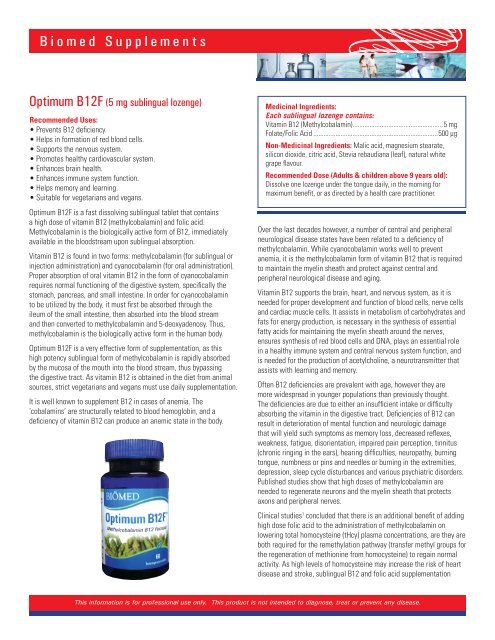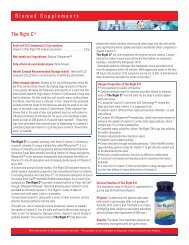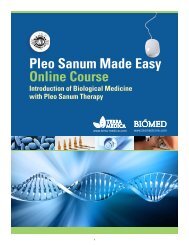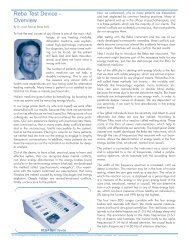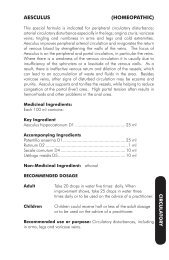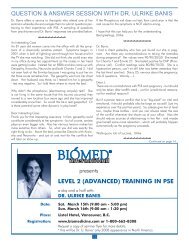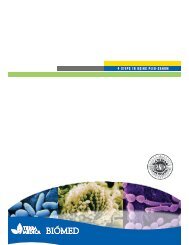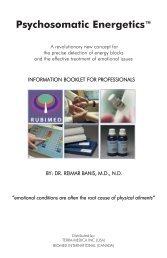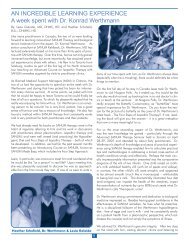View Product Monograph - Biomed
View Product Monograph - Biomed
View Product Monograph - Biomed
You also want an ePaper? Increase the reach of your titles
YUMPU automatically turns print PDFs into web optimized ePapers that Google loves.
<strong>Biomed</strong> Supplements<br />
Optimum B12F (5 mg sublingual lozenge)<br />
Recommended Uses:<br />
• Prevents B12 deficiency.<br />
• Helps in formation of red blood cells.<br />
• Supports the nervous system.<br />
• Promotes healthy cardiovascular system.<br />
• Enhances brain health.<br />
• Enhances immune system function.<br />
• Helps memory and learning.<br />
• Suitable for vegetarians and vegans.<br />
Optimum B12F is a fast dissolving sublingual tablet that contains<br />
a high dose of vitamin B12 (methylcobalamin) and folic acid.<br />
Methylcobalamin is the biologically active form of B12, immediately<br />
available in the bloodstream upon sublingual absorption.<br />
Vitamin B12 is found in two forms: methylcobalamin (for sublingual or<br />
injection administration) and cyanocobalamin (for oral administration).<br />
Proper absorption of oral vitamin B12 in the form of cyanocobalamin<br />
requires normal functioning of the digestive system, specifically the<br />
stomach, pancreas, and small intestine. In order for cyanocobalamin<br />
to be utilized by the body, it must first be absorbed through the<br />
ileum of the small intestine, then absorbed into the blood stream<br />
and then converted to methylcobalamin and 5-deoxyadenosy. Thus,<br />
methylcobalamin is the biologically active form in the human body.<br />
Optimum B12F is a very effective form of supplementation, as this<br />
high potency sublingual form of methylcobalamin is rapidly absorbed<br />
by the mucosa of the mouth into the blood stream, thus bypassing<br />
the digestive tract. As vitamin B12 is obtained in the diet from animal<br />
sources, strict vegetarians and vegans must use daily supplementation.<br />
It is well known to supplement B12 in cases of anemia. The<br />
‘cobalamins’ are structurally related to blood hemoglobin, and a<br />
deficiency of vitamin B12 can produce an anemic state in the body.<br />
Medicinal Ingredients:<br />
Each sublingual lozenge contains:<br />
Vitamin B12 (Methylcobalamin)......................................................5 mg<br />
Folate/Folic Acid..........................................................................500 µg<br />
Non-Medicinal Ingredients: Malic acid, magnesium stearate,<br />
silicon dioxide, citric acid, Stevia rebaudiana (leaf), natural white<br />
grape flavour.<br />
Recommended Dose (Adults & children above 9 years old):<br />
Dissolve one lozenge under the tongue daily, in the morning for<br />
maximum benefit, or as directed by a health care practitioner.<br />
Over the last decades however, a number of central and peripheral<br />
neurological disease states have been related to a deficiency of<br />
methylcobalamin. While cyanocobalamin works well to prevent<br />
anemia, it is the methylcobalamin form of vitamin B12 that is required<br />
to maintain the myelin sheath and protect against central and<br />
peripheral neurological disease and aging.<br />
Vitamin B12 supports the brain, heart, and nervous system, as it is<br />
needed for proper development and function of blood cells, nerve cells<br />
and cardiac muscle cells. It assists in metabolism of carbohydrates and<br />
fats for energy production, is necessary in the synthesis of essential<br />
fatty acids for maintaining the myelin sheath around the nerves,<br />
ensures synthesis of red blood cells and DNA, plays an essential role<br />
in a healthy immune system and central nervous system function, and<br />
is needed for the production of acetylcholine, a neurotransmitter that<br />
assists with learning and memory.<br />
Often B12 deficiencies are prevalent with age, however they are<br />
more widespread in younger populations than previously thought.<br />
The deficiencies are due to either an insufficient intake or difficulty<br />
absorbing the vitamin in the digestive tract. Deficiencies of B12 can<br />
result in deterioration of mental function and neurologic damage<br />
that will yield such symptoms as memory loss, decreased reflexes,<br />
weakness, fatigue, disorientation, impaired pain perception, tinnitus<br />
(chronic ringing in the ears), hearing difficulties, neuropathy, burning<br />
tongue, numbness or pins and needles or burning in the extremities,<br />
depression, sleep cycle disturbances and various psychiatric disorders.<br />
Published studies show that high doses of methylcobalamin are<br />
needed to regenerate neurons and the myelin sheath that protects<br />
axons and peripheral nerves.<br />
Clinical studies 1 concluded that there is an additional benefit of adding<br />
high dose folic acid to the administration of methylcobalamin on<br />
lowering total homocysteine (tHcy) plasma concentrations, are they are<br />
both required for the remethylation pathway (transfer methyl groups for<br />
the regeneration of methionine from homocysteine) to regain normal<br />
activity. As high levels of homocysteine may increase the risk of heart<br />
disease and stroke, sublingual B12 and folic acid supplementation<br />
This information is for professional use only. This product is not intended to diagnose, treat or prevent any disease.
<strong>Biomed</strong> Supplements<br />
could be a therapeutic strategy to combat the risk associated with<br />
atherosclerosis and cardiovascular disease in patients.<br />
Folic acid, also called Vitamin B9, along with vitamin B12, is required<br />
for the synthesis of DNA, the principal genetic material in the body.<br />
Folic acid helps the body form red blood cells and aids in the formation<br />
of genetic material within every cell of the body. Scientific evidence<br />
suggests that adequate folic acid may reduce a woman’s risk of having<br />
a child with a brain or spinal cord defect, making it an important<br />
prenatal nutritional supplement or for those planning to become<br />
pregnant. Folic acid deficiency can also cause fatigue and weakness,<br />
along with irritability, cramps, anemia, nausea, loss of appetite,<br />
diarrhea, hair loss, mouth and tongue pain, and neurological problems.<br />
Folic Acid and the Treatment of Elevated Homocysteine<br />
A significant component in the pathogenesis, prevention, and<br />
treatment of heart disease and stroke involves the amino acid<br />
homocysteine. Increased blood levels of homocysteine are correlated<br />
with significantly increased risk of coronary artery disease, myocardial<br />
infarction, and peripheral or cerebral occlusive disease. Elevated<br />
levels of homocysteine have also been correlated with a variety<br />
of other clinical conditions, such as nervous system disorders.<br />
Decreased plasma folate levels are correlated with increased levels<br />
of homocysteine, and a subsequent increased incidence of coronary<br />
artery disease.<br />
In a 15 year Canadian study of coronary artery disease mortality in<br />
5,056 men and women aged 35 to 79, lower serum folate levels were<br />
correlated with a significantly increased risk of fatal coronary artery<br />
disease 2 .<br />
Several studies utilizing folic acid, B6, B12, and betaine, either alone<br />
or in combination, have demonstrated the ability of these nutrients to<br />
normalize homocysteine levels 3 4 .<br />
Folic Acid on Psychiatric Applications<br />
Reports indicate neuropsychiatric diseases secondary to folate<br />
deficiency might include dementia, schizophrenia-like syndromes,<br />
insomnia, irritability, forgetfulness, endogenous depression,<br />
organic psychosis, peripheral neuropathy, myelopathy, and restless<br />
legs syndrome 5 6 . Patients with major depressive disorder often<br />
demonstrate lower serum and serum folate concentrations. Lower<br />
serum folate concentrations are also associated with greater severity<br />
of depression 7 .<br />
Studies performed by Botez et al believe unrecognized and treatable<br />
folate deficiency might be the basis of a well-defined syndrome of<br />
neurologic, psychiatric and gastrointestinal disorders, with restless<br />
legs syndrome representing the main clinical expression of folate<br />
deficiency in adults. Their experience indicates an oral dose of<br />
5 - 10 mg of folic acid for 6 to 12 months can eliminate or control<br />
symptoms. 8 9 10<br />
References:<br />
1<br />
Nephrol Dial Transplant. 2002 May;17(5):916-22. Efficacy of<br />
methylcobalamin on lowering total homocysteine plasma<br />
concentrations in haemodialysis patients receiving high-dose folic<br />
acid supplementation. Koyama K, Usami T, Takeuchi O, Morozumi K,<br />
Kimura G.<br />
2<br />
Morrison H, Schaubel D, Desmeules M, Wigle D. Serum folate and<br />
risk of fatal coronary heart disease. JAMA 1996;275:1893-1896.<br />
3<br />
Van den Berg M, Boers G, Franken D, et al. Hyperhomocysteinaemia<br />
and endothelial dysfunction in young patients with peripheral arterial<br />
occlusive disease. Eur J Clin Invest 1995;25:176-181.<br />
4<br />
Van den Berg M, Stehouwer C, Bierdrager E, Rauwerda J. Plasma<br />
homocysteine and severity of atherosclerosis in young patients with<br />
lower-limb atherosclerotic disease. Arterioscler Thromb Vasc Biol<br />
1996;16:165- 171.<br />
5<br />
Audebert M, Gendre JP, Le Quintrec Y. Folate and the nervous system.<br />
Sem Hop 1979;55:1383-1387.<br />
6<br />
Young SN, Ghadirian AM. Folic acid and psychopathology. Prog<br />
Neuro- psychopharmacol Biol Psychiatry 1989;13:841-863.<br />
7<br />
Abou-Saleh MT, Coppen A. Serum and red blood cell folate in<br />
depression. Acta Psychiatr Scand 1989;80:78-82.<br />
8<br />
Botez MI, Cadotte M, Beaulieu R, et al. Neurologic disorders<br />
responsive to folic acid therapy. Can Med Assoc J 1976;115:217-223.<br />
9<br />
Botez MI, Fontaine F, Botez T, Bachevalier J. Folate-responsive<br />
neurological and mental disorders: report of 16 cases.<br />
Neuropsycho- logical correlates of computerized transaxial<br />
tomography and radionuclide cisternography in folic acid deficiencies.<br />
Eur Neurol 1977;16:230-246.<br />
10<br />
Botez MI, Peyronnard JM, Berube L, Labrecque R. Relapsing<br />
neuropathy, cerebral atrophy and folate deficiency. A close<br />
association. Appl Neurophysiol 1979;42:171-183.<br />
102 - 3738 North Fraser Way<br />
Burnaby, B.C. V5J 5G7<br />
1-800-665-8308<br />
www.biomedicine.com<br />
This information is for professional use only. This product is not intended to diagnose, treat or prevent any disease.


